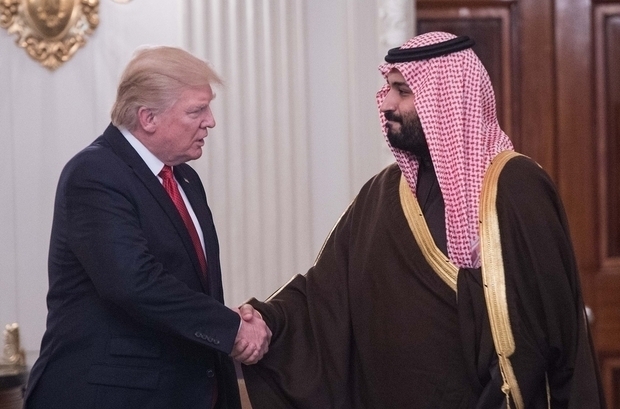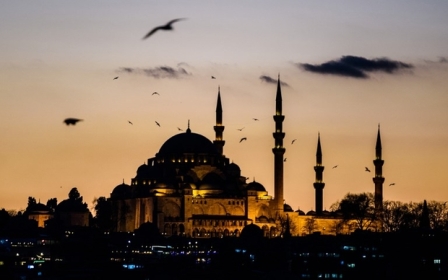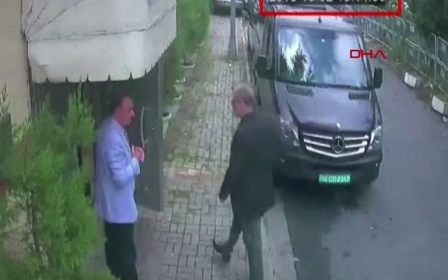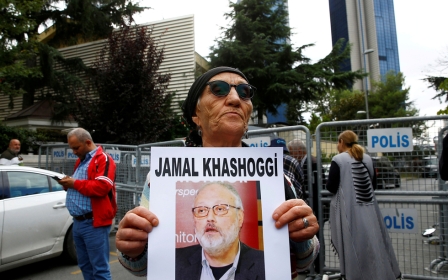Trump: Khashoggi disappearance no reason to stop US arms sales to Saudis

Donald Trump says he sees no reason to block Saudi investments in the United States, despite growing concerns over the fate of missing Saudi journalist Jamal Khashoggi.
The US president told reporters at the White House on Thursday that blocking US arms sales to Riyadh would simply push the Saudi government to buy weapons from Russia and China.
"[The Saudis are] spending $110bn on military equipment and on things that create jobs ... for this country. I don't like the concept of stopping an investment of $110 billion into the United States," Trump said.
He said the US is expecting a report on what happened to the journalist, who was last seen on 2 October when he entered the Saudi consulate in Istanbul to retrieve paperwork.
Trump did not provide any other details about that report, however, or when he expects it to be completed.
"What happened is a terrible thing, assuming that happened," he told reporters. "Maybe we'll be pleasantly surprised, but somehow I doubt it."
On Thursday, British investor Richard Branson said he was suspending his business relations with Saudi Arabia, including discussions for Saudi investment in his Virgin venture capital conglomerate, until more details emerge on the fate of Khashoggi.
He is also stepping away from his role as a director in two Saudi tourism projects around the Red Sea.
"What has reportedly happened in Turkey around the disappearance of journalist Jamal Khashoggi, if proved true, would clearly change the ability of any of us in the West to do business with the Saudi Government," Branson said in a statement.
"We have asked for more information from the authorities in Saudi and to clarify their position in relation to Mr Khashoggi."
Several media companies also confirmed on Thursday they were pulling out of the upcoming Future Investment Initiative, a Saudi investment conference, because of Khashoggi's disappearance.
The US State Department said on Thursday afternoon that the Saudi ambassador to the US is headed back to Riyadh and the US government expects him to return to Washington with information on Khashoggi's disappearance.
"I'm told that he's headed back to his home country and we expect some information when he gets back," said spokesperson Heather Nauert.
Turkish officials have said they believe that Khashoggi, a columnist for the Washington Post and prominent critic of Saudi ruler Mohammed bin Salman's policies, was killed inside the consulate.
A Turkish source told Middle East Eye this week that Khashoggi was dragged from an office in the consulate, killed and dismembered.
Saudi officials have strongly denied any involvement in his disappearance and say he left the consulate soon after arriving last Tuesday. They have not presented any evidence to corroborate their claim, however. They say that video cameras at the consulate were not recording at the time.
Trump also said US investigators were in Turkey, working with the Turks and Saudis, to probe the disappearance. That was denied by Turkish sources, however, who told Turkey's state-run news agency Anadolu "the information saying that the US appointed an investigator is not true".
Meanwhile, Turkish presidential spokesperson Ibrahim Kalin told state-run news agency Anadolu that Turkey and Saudi Arabia have agreed to form a joint working group to look into what happened. The decision comes at the request of Saudi Arabia, Kalin said.
Calls for US investigation grow louder
The US has been under increased pressure to demand answers from Saudi Arabia, a longtime US ally in the Middle East, as to Khashoggi's disappearance.
US-Saudi relations have grown even stronger since Trump took office. He visited Saudi Arabia on his first international trip as president, announcing $110bn in proposed arms sales with the Gulf kingdom at the time.
On Thursday morning, Trump told Fox News's early-morning show, Fox & Friends, that the US is working with Turkey and Saudi Arabia to investigate what happened.
"We want to find out what happened," Trump said. "He went in, and it doesn't look like he came out. It certainly doesn't look like he's around."
Bob Corker, a Republican Senator who chairs the Senate Foreign Affairs Committee, said on Thursday that "significant sanctions" would have to be imposed at the "highest levels" of the Saudi government if Khashoggi was the victim of a state-sponsored killing, AP reported.
"If it turns out to be what we all think it is today but don't know, there will have to be significant sanctions placed at the highest levels," he said.
A day earlier, more than two dozen US Democratic and Republican senators, including Corker, invoked a human rights law to demand that Trump formally investigate Khashoggi's disappearance.
The Magnitsky Law requires the president to act on requests for investigations by the leaders of the Foreign Affairs Committee.
"The recent disappearance of Saudi journalist and Washington Post columnist Jamal Khashoggi suggests that he could be a victim of a gross violation of internationally recognised human rights," the letter stated.
Call to block arms sales
Republican Senator Rand Paul also said this week that he would attempt to force a vote in the Senate blocking US arms sales to Saudi Arabia, if the reports about Khashoggi's disappearance prove true.
Chris Murphy, a Democratic Senator from Connecticut, also called for at least a temporary halt to US support for the Saudi-led war in Yemen. He said if Saudi Arabia isn't telling the truth about Khashoggi, then "why would we believe them that they are not intentionally hitting civilians inside Yemen?"
Several other US lawmakers have also raised concerns, saying the US should reevaluate its ties to Saudi Arabia in light of the journalist's case.
Conference boycott
Several media companies gave their reasons on Thursday for pulling out of the Future Investment Initiative, due to be held in in Riyadh later this month.
Andrew Ross Sorkin, a CNBC anchor and New York Times business journalist, tweeted that he was not attending the conference, saying he was "terribly distressed by the disappearance of journalist Jamal Khashoggi and reports of his murder".
Economist Editor-In-Chief Zanny Minton Beddoes will not participate in the conference, spokeswoman Lauren Hackett said in an email.
The New York Times has also decided to pull out of the event as a media sponsor, spokeswoman Eileen Murphy said.
The Financial Times said in a statement that it was reviewing its involvement as a media partner, the Reuters news agency reported.
Uber Technologies Chief Executive Officer Dara Khosrowshahi said in a statement he will not attend the conference unless a substantially different set of facts emerge.
Viacom Chief Executive Bob Bakish, who was due to speak at the conference, has decided to not attend the event, company spokesman Justin Dini said.
Other media companies slated to appear at the conference include CNN and Bloomberg, according to the event's website.
New MEE newsletter: Jerusalem Dispatch
Sign up to get the latest insights and analysis on Israel-Palestine, alongside Turkey Unpacked and other MEE newsletters
Middle East Eye delivers independent and unrivalled coverage and analysis of the Middle East, North Africa and beyond. To learn more about republishing this content and the associated fees, please fill out this form. More about MEE can be found here.




